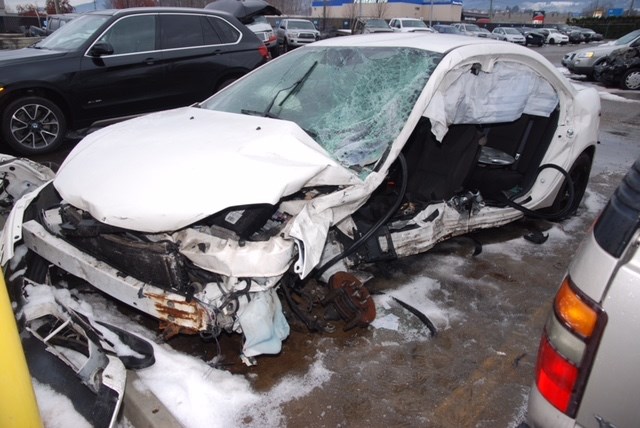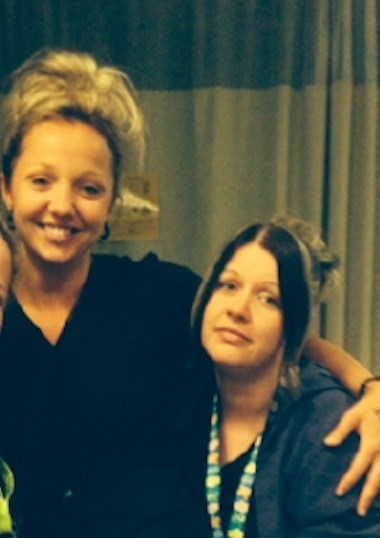
The damaged vehicle Erin Smith and Lindsey Hauck were in the night of the crash.
Image Credit: Contributed
June 18, 2018 - 6:30 PM
VERNON - Two families whose lives were changed forever by a drunk driver didn’t get to leave the nightmare behind them after the offender was convicted and taken away to jail. They went back to court.
Vernon nurse Lindsey Hauck sued her drunk driver, Lori Victoria Vance, in civil court for care costs, lost income and other damages. Erin Rae Smith, a Kelowna nurse, was killed in the crash, and her parents also sued Vance over the loss of the love, guidance, care, affection and companionship of a daughter, as well as associated financial costs, according to court documents.
Civil lawsuits are an ugly, imperfect way of cleaning up the mess left behind by drunk driving cases, but for victims and their families, it’s often the only way to start picking up the pieces, Vernon lawyer Michael Yawney — Hauck’s legal counsel — says.
“Unfortunately, in my 27 years, there’ve been far too many claims where I’ve helped people catastrophically injured by drunk drivers,” Yawney says. “It’s always sad to deal with those. It’s devastating — altering a person’s plans and hopes and dreams and physical abilities in an accident like that, it’s life-changing.”

Lindsey Hauck (left) and Erin are Smith.
Image Credit: Contributed
Vance, 40, was sentenced in 2017 to three years in jail for getting behind the wheel of her Chevy Uplander after consuming several drinks at a local pub and speeding as much as twice the legal limit through a downtown Vernon intersection. Smith and Hauck, on a coffee break from work at Vernon Jubilee Hospital, were T-boned when Vance ran a red light.
While the criminal court system addresses the appropriate punishment for the offender, it doesn’t offer any help when it comes to compensation for victims who are often left with hefty medical bills, inability to work, and other physical and emotional challenges.
For Hauck, who was 31 at the time of the crash and earning her living caring for others as a nurse, the incident brought profound effects.
“She has suffered a traumatic brain injury at a pivotal age in her life,” the notice of claim states. “She has debilitating headaches, loss of hearing, grief, depression, anxiety, low frustration tolerance, diplopia, difficulty with balance, difficult being in busy environments, difficulty concentrating, low motivation and a tendency to isolate herself. It is likely the plaintiff will remain this way for the remainder of her life.”
Hauck’s case was set for trial in April of this year, but it was settled before then, according to documents filed in court. Neither Hauck nor her lawyer would comment whatsoever on the outcome of the case, however it is reasonable to believe the settlement was substantial. It is common for settlements to be accompanied by confidentiality, or non-disclosure agreements preventing lawyers or their clients from speaking publicly about the outcome.
Speaking generally as an accident and injury lawyer, Yawney says civil suits are a painful process for all involved, but victims have no other options for compensation.
“In my years of experience, the insurance industry is focussed singularly on their bottom line,” Yawney says. “It’s an ongoing frustration as a lawyer to see how insurance companies treat their insured people — people who’ve paid for coverage and have to fight tooth and nail to get even a minimum amount. That belief by the public that if you have coverage, it’s there for you, well, most often you have to fight for it, and many times you’re treated as if you’re in the wrong.”
A FEW TOO MANY DRINKS CAN LEAVE YOU IN FINANCIAL RUIN
We don’t know the details of Hauck’s settlement, but it’s likely that Vance will have to come up with the damages herself.

Lori Victoria Vance is escorted from the Vernon courthouse following a sentence hearing Fevb. 27, 2017.
(CHARLOTTE HELSTON / iNFOnews.ca)
In criminally convicted drunk driving cases, it’s common for ICBC to deny coverage since driving drunk is a breach of the contract of insurance. ICBC can then file a third party notice against the driver, which allows it to defend the lawsuit. The driver is then left to hire his or her own lawyer, or represent themselves, and is on the hook for damages.
“People need to realize that if you drive drunk and injure someone or cause property damage, you can have zero insurance coverage and so be wiped out financially… all because you had that extra drink or two,” Yawney says.
“WE ALL HAVE A RESPONSIBILITY”
It’s not just about the driver. In both the Hauck and the ongoing Smith case, drinking establishments and their servers were brought into the suit as well and faced unproven allegations that Vance was over-served and that not enough was done to prevent her from getting behind the wheel. Hauck’s claim originally named pubs, servers and others, although she later filed a notice of discontinuance against them. Two drinking establishments were initially named and prior to the notice of discontinuance, both denied the allegations in court documents. One said that Vance was never even at the bar.
Yawney says any commercial host that serves alcohol has a duty to monitor their patrons, cut them off if they’ve had too much, and call them a cab as needed.
“I think the vast majority of drinking establishments really take responsibility for that,” Yawney says, adding however that where humans are involved, errors in judgement do happen.
In B.C., all servers and managers are required to take the self-study course Serving it Right, which covers the legal responsibilities for serving alcohol. The course goes over common signs of intoxication — such as stumbling, poor hand-eye coordination, and changes in speech — and reiterates that you can’t sell or serve alcohol to someone who is intoxicated, or apparently intoxicated. Yawney notes that while a server’s actions could be scrutinized in a lawsuit, they would likely be covered by their employer.
But it’s not just bars — individual social hosts can be liable too. That includes parties and gatherings held in private residences.
“If you’re knowingly contributing to the intoxication of an individual and know they’re getting into a vehicle, you can potentially be liable,” Yawney says.
The bottom line?
“We all have a responsibility to keep society safe,” he says.
Having witnessed the huge toll accidents and ensuing lawsuits have on victims and their families, Yawney urges people to each do their part to prevent drinking and driving.
“The (court) process itself is ugly. The money side is an imperfect way to deal with it; everyone would gladly prefer to go back in time and not have to go through this,” he says.
NOT OVER YET
While Hauck’s case is settled, Smith’s parents are still fighting for damages. They say in their notice of claim, filed in 2016, that if their daughter had lived, she would have been entitled to sue for damages. They call Vance’s actions that night “completely irresponsible and totally reprehensible” and claim more should have been done to prevent Vance from driving drunk.
Vance continues to serve her three-year sentence and is on day parole with conditions not to have contact with the surviving victim or either of the families. She was given special permission by the Parole Board of Canada, however, so she could attend legal proceedings.
“As you currently have an imposed condition to avoid contact with the surviving victim or any member of the victims' families and the legal situation will require you to be present during the court hearings, the CSC (Correctional Service of Canada) recommends this special condition be amended to allow for you to have contact with the victims, solely for the purpose of legal proceedings as directed by the courts,” the parole board said in April.
She was recently denied a request for full parole.
To contact a reporter for this story, email Charlotte Helston or call 250-309-5230 or email the editor. You can also submit photos, videos or news tips to the newsroom and be entered to win a monthly prize draw.
We welcome your comments and opinions on our stories but play nice. We won't censor or delete comments unless they contain off-topic statements or links, unnecessary vulgarity, false facts, spam or obviously fake profiles. If you have any concerns about what you see in comments, email the editor in the link above.
News from © iNFOnews, 2018